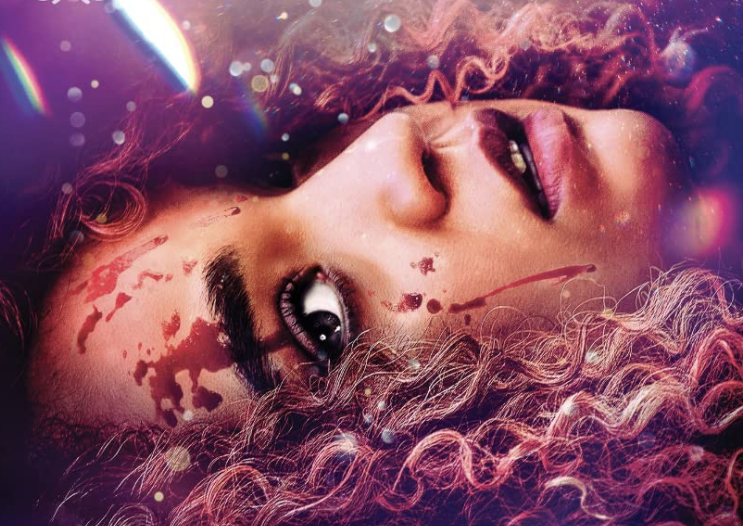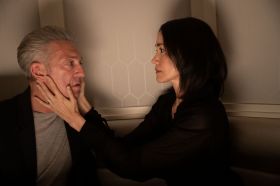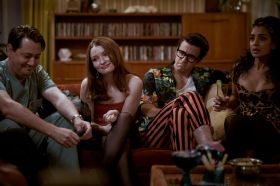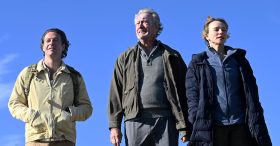Let’s open with an endearing success/unsuccess story. Sissy is a low budget comedy horror film written and directed by Hannah Barlow and Kane Senes in Canberra during Covid. Across this year it has run in the respectable Sydney, Melbourne, Perth Revelation and Edinburgh Film Festivals, but also broke out into the wild, wonderful world of genre fests. It scored a terror trifecta – It opened the midnight strand at SXSW in Austin, and won the audience awards at both the Bucheon and Sitges Fantastic Film Festivals.
Read: Sissy on way to cinemas
It was bought by Shudder, the AMC sub-brand for scary lunacy, so it is streaming in North America and should turn up in Australia. Despite inspiring reviews, it touched the Australian screen circuit very lightly. At the moment it seems to be running only at the Nova in Melbourne, and has made $80,500 in toto around the world.
Producers Lisa Shaunessy, John De Margheriti, Jason Taylor, and Bec Janek were nominated for Best Film at the 2022 AACTAs, which put Sissy’s modest practical effects and screaming up against industry heroes like Baz Luhrmann and Leah Purcell. Directors Hannah Barlow and Kane Senes were in competition for Best Director while star Aisha Dee fought the likes of Tilda Swinton for Best Actress.
Sissy won nothing, but that is not the point. Sissy and its determined band did exactly what genre filmmakers want – it established its Australian festival chops and also played hard in the world scare-and-enchant festival circuit. Antony Frajman interviewed the directors for FilmInk.
Aisha Dee has an African-American father; she started performing on Saddle Club, and moved to the US, where she has worked on four seasons of The Bold Type which runs on Stan. Kane Seynes left Australia to study in the LA part of the New York Film Academy and has now made his first US feature, Echoes of War, set in the 1860s. Hannah Barlow studied acting at NIDA, went to Los Angeles on a Heath Ledger Scholarship, struggled to cut through and turned to writing and directing.
The Barlow-Senes partnership was sealed personally and professionally with their first film, an improvised $25,000 seven-day shoot called For Now. They came back to Australia together and the rest is trans-Pacific history.
With no gore, heaps of raucous energy and the same vitality, Seriously Red has made $651,000, and $68,370 in New Zealand, all in three weeks.
Last weekend, music documentary The Angels: Kickin’ Down the Door lost 3/4 of its screens, down to 20, and 80% of the weekend take which was all of $6,400. The exhibitors briefly fondled $80,000 before turning to the figures for the popcorn.
Read: Angels and Seriously Red sing for their supper
Back to glum reality
Top of the box office list is still Black Panther: Wakanda Forever, with $1.3m over the weekend and a dominating 471 screens and $27.11m altogether. Next is perverted Xmas entertainment Violent Night, with $617,000 in week two and $1.55m altogether. Then we find comedy horror The Menu, with $553,000 and $3.09m in week three, which suggests the audience prefers a little originality with their gore.
Animated family film Strange World is next, with $2.02m in three weeks, then Black Adam with $18.75m in eight weeks, while Mrs Harris keeps going to Paris to earn $7.45m in seven weeks.
In their first week, kid’s film Tad the Explorer: the Mummy Adventure made $105,000, while the Flanders farewell picture The Road Dance scored $84,000 off 34 screens.
Two films with a modest profile look like a lot of fun. Ennio: the Maestro, which we promoted last week as catnip for film tragics, made $77,000 off thirteen screens. Mister Organ is a New Zealand documentary from David Farrier, described in stuff.co as ‘everything you are hoping it will be. This is a dark, compelling, bleakly hilarious and – at times – disturbing film’. Out on 12 screens, it made $13,000.
Neptune Frost, the Afro-futurist celebration of delirium shot in Rwanda came out on just three screens – surely a mistake – and made $2,500. Moja Vesna, directed by Slovenian-Australian Sara Kern, arrived on six screens and took $2,000. They are extremely different but met the same fate.
Next weekend, Avatar: the Way of Water comes out, either to die in a puddle of its own pretensions or dominate our desires. I am told that the special effects are beyond anything we have ever seen.





